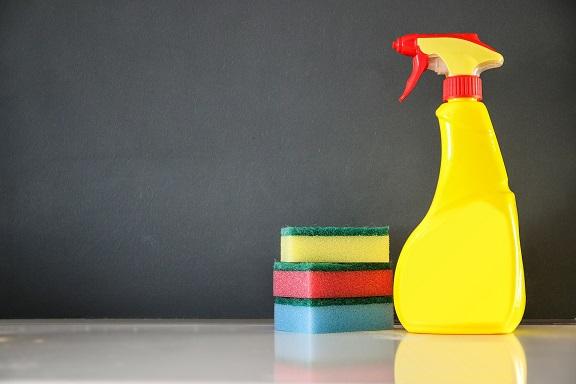Have you ever finished cleaning your bathroom with bleach, only to wonder if you should rinse the floor afterward? This is a common dilemma for many homeowners, and it’s one that deserves a thorough explanation. While bleach is a powerful disinfectant, there are some crucial considerations when it comes to rinsing it off surfaces, particularly floors.

Image: www.altroconsumo.it
The decision of whether or not to rinse bleach off the floor depends on several factors, including the type of floor, the concentration of bleach used, and the purpose of the cleaning. In this article, we’ll delve into the science behind bleach cleaning, the potential risks of not rinsing, and offer a comprehensive guide to ensure your cleaning practices are both effective and safe.
The Science Behind Bleach
Bleach: A Powerful Oxidizer
Bleach, chemically known as sodium hypochlorite, is a powerful oxidizing agent. This means that it releases oxygen atoms, which disrupt and break down the bonds of various substances, including bacteria, viruses, and mold. This oxidizing action is what makes bleach so effective in disinfecting surfaces.
Bleach and Stain Removal
Beyond its disinfecting properties, bleach is also used as a stain remover. It can effectively break down colored molecules in stains, making them less visible or even completely removing them. However, it’s crucial to use bleach cautiously on fabrics and colored surfaces, as it can also cause discoloration or damage.

Image: www.markt.de
Potential Risks of Not Rinsing Bleach
Irritating Fumes
One of the main reasons to rinse bleach off the floor is to avoid inhaling its fumes. Residual bleach can continue to release fumes, particularly in enclosed spaces, which can irritate the eyes, nose, and respiratory system. Long-term exposure to bleach fumes can even lead to more serious health problems like respiratory issues and skin irritation.
Slippery Surfaces
Bleach can leave behind a slippery residue on the floor. This can create a safety hazard, especially for children, the elderly, or anyone with mobility issues. It’s essential to rinse any bleach residue to minimize the risk of slipping and falling.
Damage to Certain Materials
Bleach can react with certain materials, leading to damage or discoloration. For example, bleach can weaken some types of flooring, like hardwood or polished concrete. While it’s generally safe to use bleach on resilient floors like vinyl or tile, it’s crucial to follow the manufacturer’s guidelines for proper cleaning procedures.
When Rinsing is Essential
Using Bleach in High Concentrations
If you’re using a high concentration of bleach, rinsing becomes even more crucial. Strong bleach solutions can be more corrosive and leave behind a stronger residue, increasing the risk of damage and irritation.
Cleaning Food Preparation Areas
For areas where food is prepared, such as kitchens or around sinks, rinsing bleach off the floor is essential. Even a small amount of residual bleach can contaminate food and pose a health risk. It’s always safer to err on the side of caution in such areas.
When Rinsing Might Not Be Necessary
Using Diluted Bleach
If you’re using a diluted bleach solution, such as a 1:10 ratio of bleach to water, and you’re cleaning a durable floor like tile, rinsing might not be strictly necessary. The concentration of bleach is low enough that the residue is less likely to pose a significant risk. However, it’s still advisable to wipe the floor with clean water to remove any remaining residue.
Using a Bleach-Based Cleaner
Many commercially available bleach-based cleaners are formulated to be rinsed off, but some are specifically designed to be left behind to provide ongoing sanitation. Always read the product label carefully and follow the manufacturer’s instructions.
Tips for Using Bleach Safely
Always Dilute Bleach
Never use bleach undiluted. Unless directed by a product label, always mix bleach with water, following a recommended ratio to minimize its strength and reduce the risk of damage and irritation.
Wear Protective Gear
When using bleach, it’s crucial to wear protective gear, such as gloves, a mask, and eye protection. This will help minimize exposure to bleach fumes and prevent skin irritation or accidental contact with the eyes.
Ventilate the Area
Ensure proper ventilation while cleaning with bleach. Open windows and doors to allow fresh air to circulate and reduce the concentration of bleach fumes.
Avoid Mixing with Other Cleaners
Never mix bleach with other cleaning products, especially ammonia-based cleaners. Mixing these chemicals can create harmful and toxic fumes. Always check product labels for warnings and use caution.
Do You Have To Rinse Bleach Off Floor
Conclusion
Whether or not to rinse bleach off the floor depends on several factors, including the concentration of bleach used, the type of floor, and the area you’re cleaning. While rinsing is often recommended to remove residue, minimize the risk of irritation, and prevent damage, there are instances where rinsing might not be necessary. Always read product labels, follow manufacturer’s instructions, and use bleach safely to keep your home clean and healthy.






